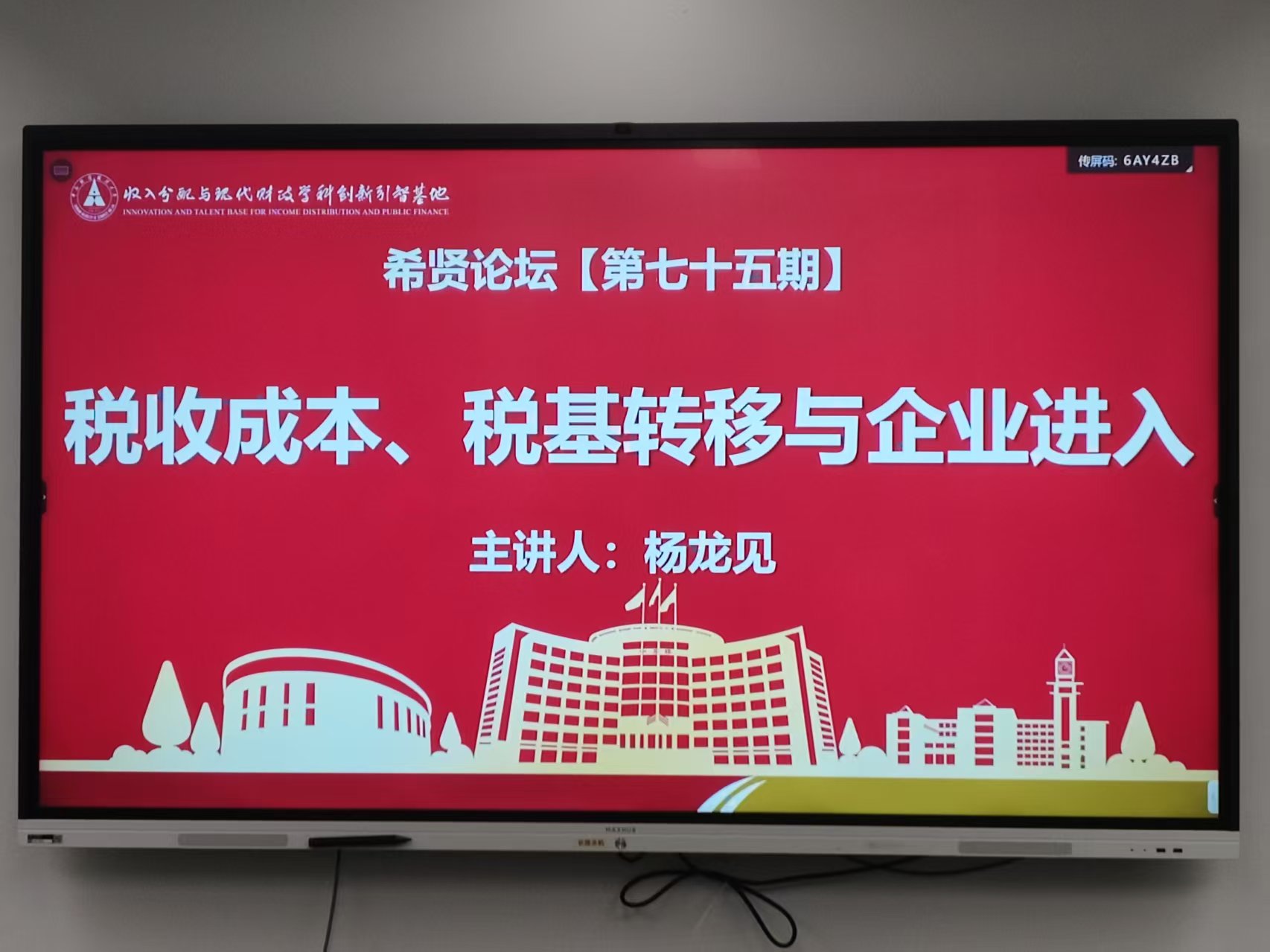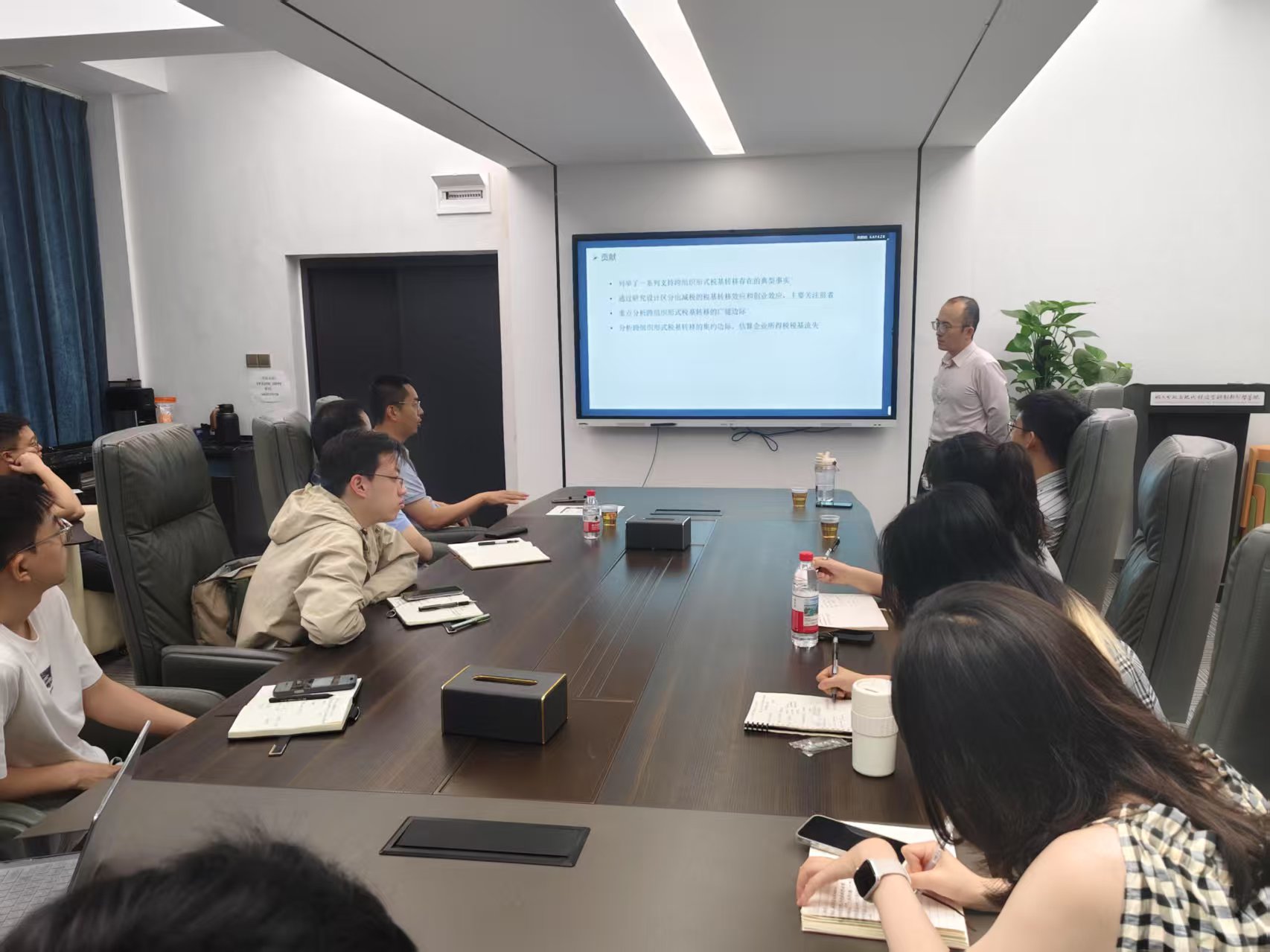On June 21, 2025, an academic conference jointly hosted by the Center for International Cooperation and Disciplinary Innovation of Income Distribution and Public Finance (111 Center) and the School of Public Finance and Taxation at Zhongnan University of Economics and Law (ZUEL) was successfully held in Wenqin Building's Conference Room 119. Professor Yang Longjian, as a keynote speaker of the academic forum, delivered a speech titled "Tax Costs, Tax Base Shifting, and Business Entry". The academic forum was chaired by Zhao Ying, a research fellow of the 111 Center, and attended by more than ten people, including Lu Yuanping, Executive Director of the 111 Center, and Sun Yukun, Associate Professor of the School of Public Finance and Taxation at ZUEL.

Professor Yang Longjian approached the discussion from the perspective of modernizing the national fiscal and tax framework. He emphasized that the establishment of a balanced and coordinated modern tax framework is essential for building a robust modern tax system. Incorporated enterprises in China are subject to dual taxation encompassing corporate income tax and shareholders' individual income tax, whereas unincorporated enterprises face a progressive individual income tax rate ranging from 5% to 35%. This resulted in a significant disparity in effective tax rates, giving enterprises an incentive to restructure their organizational forms so as to shift the tax bases. The tax base shifting across enterprise organizations caused by this imbalance, featuring a large scale and specialization, not only reduced resource allocation efficiency but also led to some fiscal losses. Therefore, understanding the behavioral responses of business entry and tax base shifting to differences in tax costs is important for accurately assessing the effectiveness of tax reduction reforms and promoting institutional coordination among different taxes.
Through a thorough integration of empirical studies and policy simulations, Professor Yang Longjian found that while enterprises exhibit certain behavioral responses, the entrepreneurial incentive effect instigated by individual income tax reforms outweighs the effect of tax base shifting, providing a key basis for optimizing tax reduction policies. In addressing the challenges of tax base shifting governance, Professor Yang proposed three solutions: to promote the neutralization of the tax structure and draw on international experience to bridge corporate tax rate disparities, to strengthen enterprise management throughout the lifecycle, and to fully consider the heterogeneity of industries and enterprises. Targeted governance measures should be applied to high-liquidity and high-yield industries.

During the discussion session, the participating scholars engaged in in-depth exchanges on regulatory challenges. They highlighted the exploration of equity penetration to study business owners' concealed control behaviors, and focused on the integrated mechanism for tax avoidance across various tax categories. The teachers and students present had a lively discussion on the establishment of a fair and sustainable modern tax system.
Guest Profile
Professor Yang Longjian serves as Director of the Taxation Department at the School of Public Finance and Taxation of the Central University of Finance and Economics, and Distinguished Young Scholar of Longma Scholar Program. He has led the General Program and Youth Program of the National Natural Science Foundation of China, and the Ministry of Education's Humanities and Social Sciences research projects. He has authored dozens of papers published in renowned journals, including Social Sciences in China, Economic Research Journal, China Economic Quarterly, Journal of Financial Research, and China Industrial Economics. His research achievements have been awarded the first and second prizes of the National Outstanding Theoretical Research in Finance Award.
